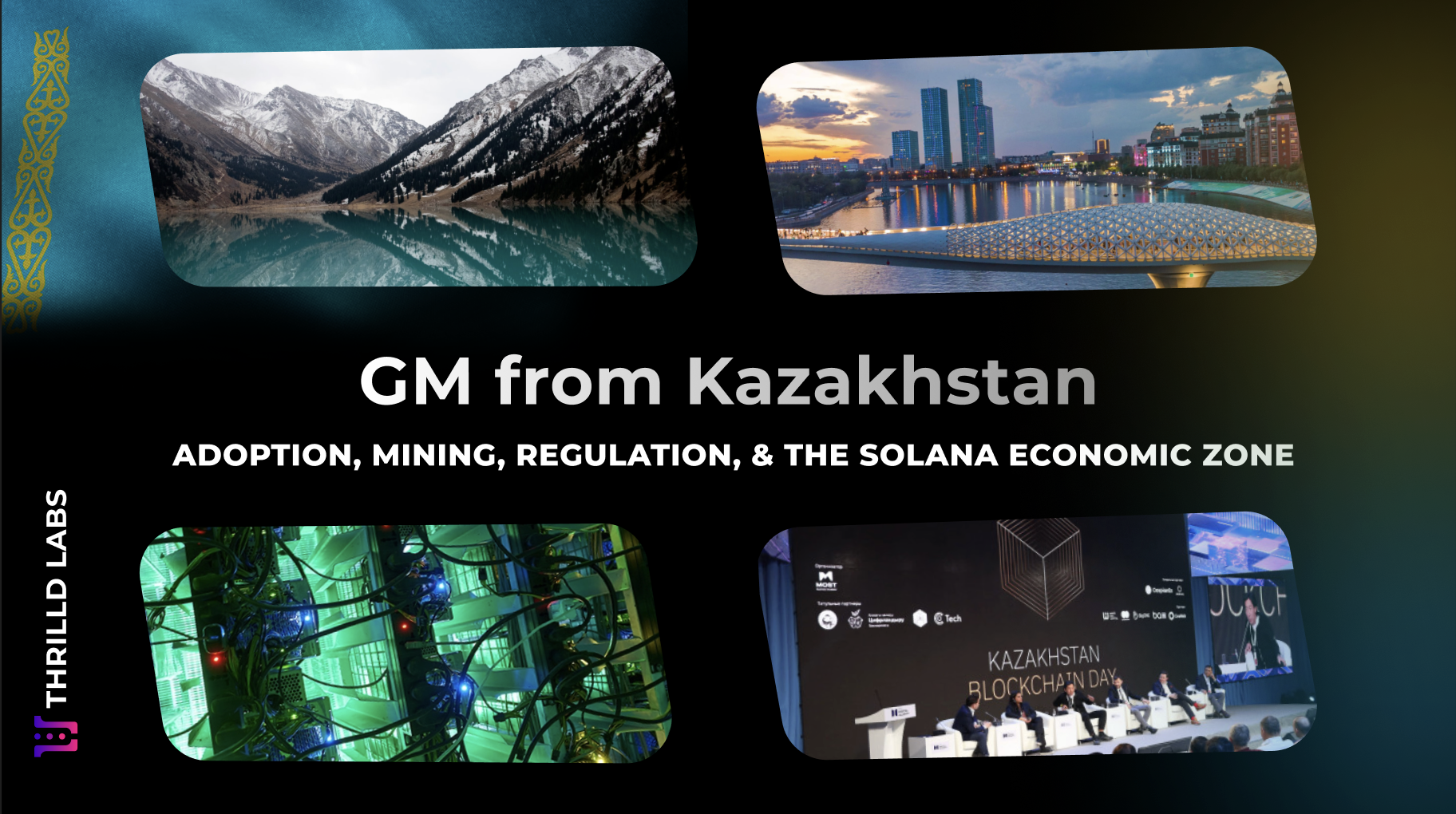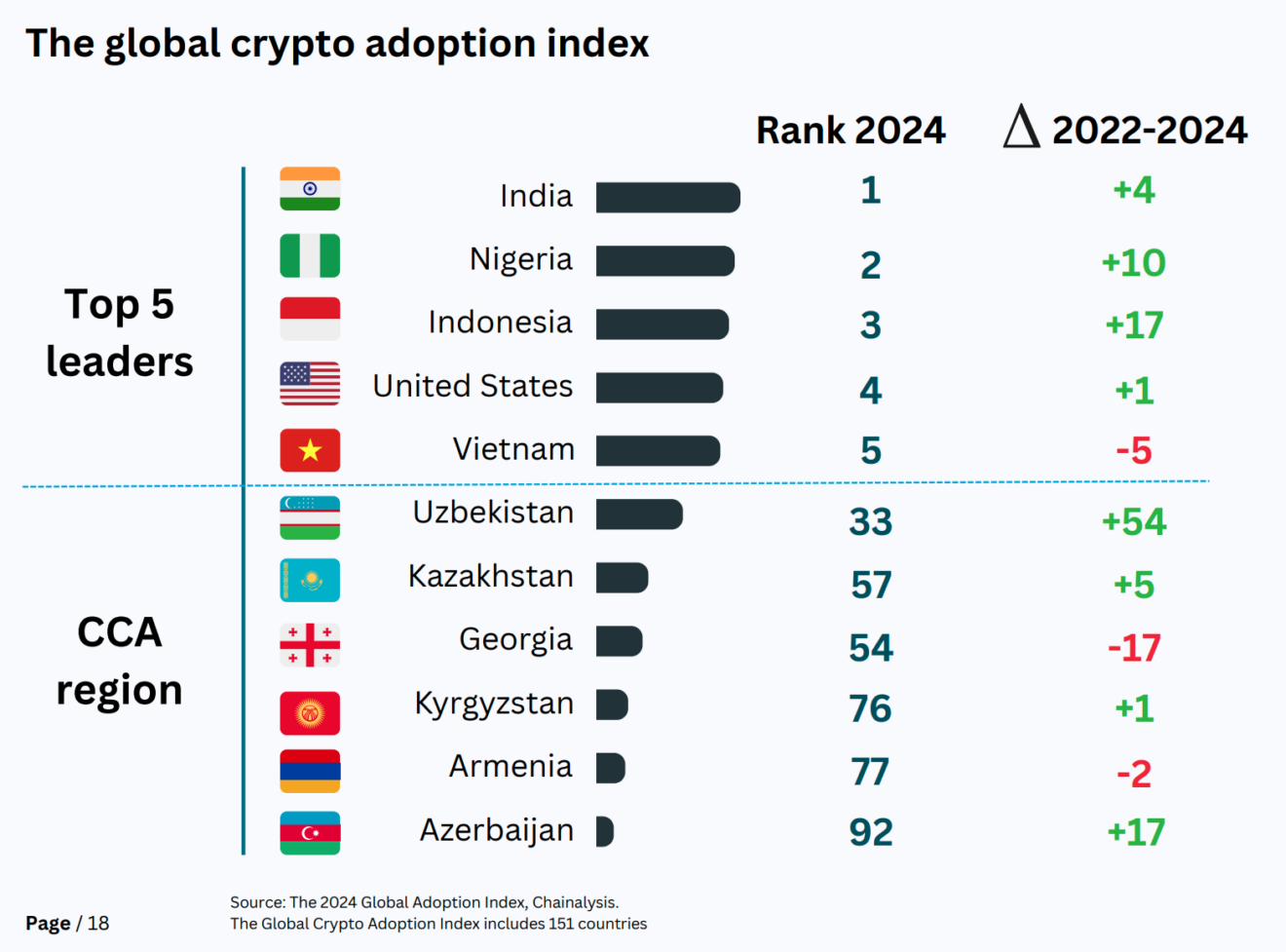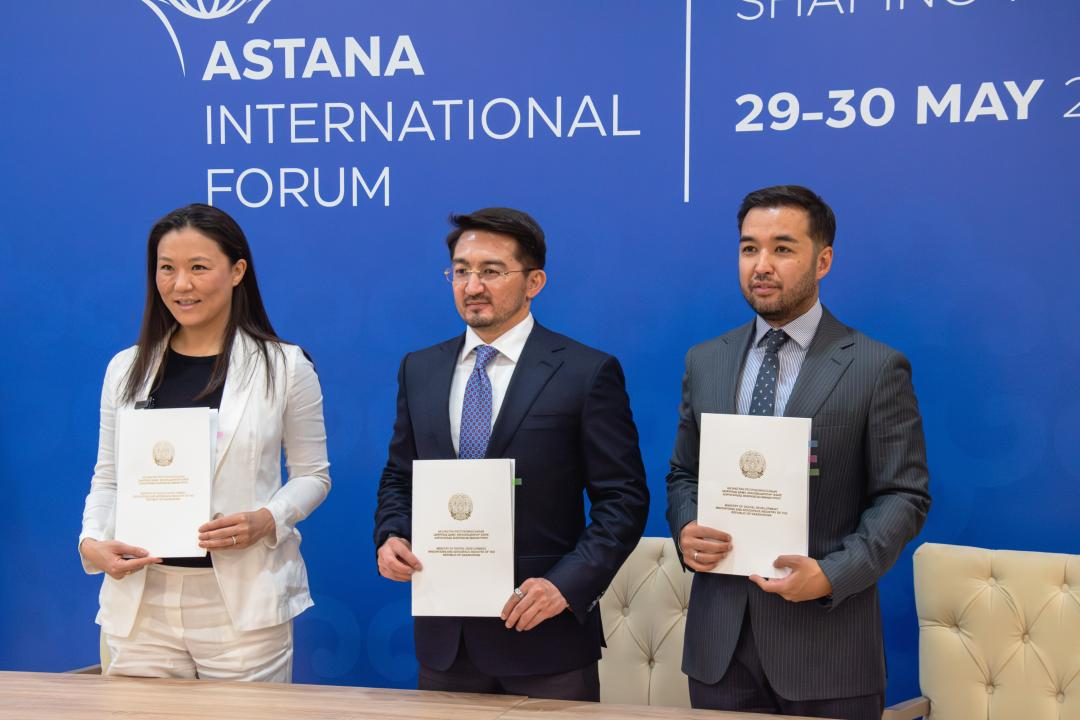GM from Kazakhstan
As a global Web3 company, and one that actively works with international events, communities, and partners, we are very curious to know more about the Web3 ecosystem and emerging crypto spaces in different countries. So... GM from Kazakhstan, a country some of our team members originate from! This time, we turn to Central Asia and question ourselves: what is the crypto industry in Kazakhstan like? How about regulation? Is mining still hot in 2025? And how about this Solana Economic Zone? Read on for answers in this epic piece written by Thrilld's Kendall Brown...

In previous editions of GM From, we looked at how the crypto industry is developing in countries including Sweden, Kyrgyzstan, and Nigeria, what adoption looks like, and what we can expect looking ahead. This time, we turn to Kazakhstan. What is the crypto industry in Kazakhstan like? Why does this matter? And what can we learn from the ecosystem in Kazakhstan?
At Thrilld Labs, our team has included people from around the world, coming from countries such as the Netherlands and Italy to South Korea, Russia, the United States, Nigeria, and China too. By the way, two of our team members, Assel Altayeva (Junior Software Engineer) and Sultan Takibay (Junior Software Engineer), are also from Kazakhstan!
Fundamentally, we argue that global collaboration is a big part of what Web3 intends: creating an ecosystem that removes traditional barriers to participation thanks to its inherent construction around a decentralized network. However, even with these decentralized beginnings, there remain challenges for everyone to have the same opportunities.
Whether it be from the lack of an internet connection or laptop, a heavily felt knowledge gap, or legal limitations, your location and personal situation is a determining factor in Web3. And, where you live and who you are surrounded by, fortunately or unfortunately, do influence your work environment and how easily you can enter or do business in the Web3 space, or any, for that matter! (Networking Theories: Human Connectivity in Web3, Thrilld Labs).
At the same time, we see the global nature of Web3 coming to the surface in global teams (such as our own :)), in the increasing number of international Web3 companies, and, last but not least, in all the Web3 events taking place globally.
As a global Web3 company, and one that actively works with international events, communities, and partners, we are very curious to know more about the Web3 ecosystem and emerging crypto spaces in different countries.
We therefore explore the Web3 space in Kazakhstan, from mining farms to legal reforms and new economic zones built on blockchain…
Web3 in Kazakhstan
Kazakhstan is located in Central Asia, extending from the Caspian Sea in the West all the way to the Altai Mountains and almost to the Mongolian border in the East. The country also shares a long border with Russia and China, and has beautiful natural scenes from the seaside and cannons of the energy-rich lowlands in the west, to snowy mountains in the industrialized north.
Kazakhstan’s investments in the oil sector has brought rapid economic growth, somewhat easing disparities in wealth from the 1990s. In technology, the government is referred to frequently as pro-technology, providing support and financing for emerging technologies such as AI, blockchain, and IoT projects in digital transformation, even from early on.
In 2004, for example, e-government in Kazakhstan was first announced and in that same year, a program for the establishment of e-government was approved which created a platform with informational services (Digital Kazakhstan: Pioneering E-Government and AI Innovations Amid New Challenges). Today, Kazakhstan has solidified its position as a leader in digital transformation, ranking among the top twenty-five countries in e-government and “achieving significant milestones in IT innovation” (Digital Kazakhstan: Pioneering E-Government and AI Innovations Amid New Challenges).
One could argue that with Kazakhstan’s strong fintech sector which brings extensive banking services and digital payment solutions, there is only a limited need for crypto in the country. Indeed, for banking penetration in 2021, the rate was 81% and even 89% of payments in Kazakhstan are cashless (Cryptocurrency Ownership Expanding in Central Asia).
Crypto Adoption and Usage Cases
Nonetheless, Kazakhstan’s population owning cryptocurrencies has increased in 2024 to 8% up from 4% in 2022. The majority (83%) are men. Most investors are aged 18-34 (83%), with 47% in the 25-34 range. Income-wise, 78% are middle-income, 12% are high-income, and 8% are low-income (Cryptocurrency Ownership Expanding in Central Asia, Says Latest Report).
Kazakhstan thus ranked 57th in the 2024 Global Crypto Adoption Index, up five spots. Globally, India ranks first, followed by Nigeria, Indonesia, the United States, and Vietnam. For Kazakhstan, while adoption rates aren’t as significant when compared to nearby Uzbekistan (ranked 33rd), it is still notable that it is moving up on the list and crypto is gaining traction. Additionally, this report only tracks the adoption rates between 2022-2024 and leaves out one of the major events that Kazakhstan has taken towards blockchain technologies; the Solana Economic Zone, explored a little later on.

Photo credit: screenshot from the report by Rise Research and Freedom Horizons.
According to Assel Satubaldina at The Astana Times, Kazakh citizens choose cryptocurrency assets for their inherent value, for long-term investments as well as in the light of the general upcoming popularity of the crypto markets, and a belief in blockchain for transparency and financial inclusion more broadly. All very good reasons, indeed. Interestingly, Kazakhs have tended to invest into Bitcoin mining. As of October 2021, “Kazakhstan was responsible for 27.3% of the global mining activity… making it the second-largest Bitcoin miner in the world after the United States” (Cryptocurrency Ownership Expanding in Central Asia, Says Latest Report). Since China banned cryptocurrency mining in 2021, Kazakh's mining became a viable option given its cheap electricity and fewer regulations at the time, although Satubaldina notes that much of this mining was illegal.
The Regulatory Framework in Kazakhstan
In the past, Kazakhstan enjoyed relatively little oversight in regulations on cryptocurrencies until the sudden popping up of several massive mining farms in 2019 and the Government of Kazakhstan began increasing its control in the sector.
On April 1, 2023, the Law on Digital Assets in the Republic of Kazakhstan became the complete regulatory system for cryptocurrency activity, which is intended to “develop activities for the issuance and circulation of digital assets, digital mining in the Republic of Kazakhstan for the economic development and competitiveness of the Republic of Kazakhstan” (Digital Assets Law No. 193-VII). In practice, international law firm Gofaizen & Sherle notes that “the legislation provides the possibility of [the cryptocurrencies] issue and circulation through the Astana Financial Center (AIFC)”.
Moreover, when companies obtain a license they will be able to legally provide services of purchase, sale, and exchange of cryptocurrencies in exchange for fiat money or another cryptocurrency, to accept and transfer payments in cryptocurrency (Crypto License in Kazakhstan). Gofaizen & Sherle also points out six advantages of cryptocurrency licenses including: favorable tax regime, convenient and fast registration of foreign citizens, sustainable legislative framework, simplified currency regime, simplified visa and labor regime, and ensuring security and transparency of financial markets.
However, with the regulations also comes a list of compliance rules and requirements that companies must adhere to. The Astana Times reports about the regulatory framework: “In April 2023, Kazakhstan’s law on digital assets prohibited the use of unsecured digital assets, stablecoins, and security tokens, except within the AIFC framework” (Cryptocurrency Ownership Expanding in Central Asia, Says Latest Report). Indeed, Shweta Chakrawarty from Coinfomania reports, “Since 2024, the government has closed 36 unregulated crypto exchanges and confiscated 4,000 mining devices. This is a clear indication of the shift towards the hands-on approach to a more controlled and regulated system” (Cryptocurrency Regulations in Kazakhstan).
So, regulations might be a double edged sword…setting regulations intend to secure and safeguard the ecosystem with official government oversight, yet the control requires compliance with specific parameters that may stifle a project's capabilities and innovative freedom for crypto users and builders in general.
Then, in May 2025 Deputy Chairman of the National Bank Berik Sholpankulov announced that the National Bank of Kazakhstan is preparing a “comprehensive legislative framework to regulate the circulation of digital assets, following the withdrawal of approximately $15 billion in crypto assets from the country due to insufficient regulatory oversight” (Kazakhstan to Tighten Cryptocurrency Regulation Following $15 Billion Capital Outflow).
The new regulations will address significant capital outflows and the safety of digital transactions which were believed to be undermined by the previous absence of a well-structured legal and administrative environment. Its two main components are firstly, the legal status and procedures for issuing and using digital financial assets, and secondly, a licensing regime for service providers involved in the exchange of unsecured cryptocurrencies.
Additionally, the Government is developing its own Digital Tenge, a central bank digital currency and open banking infrastructure, predicted to fully launch by the end of 2025 (Cryptocurrency Regulations in Kazakhstan). This move comes alongside the global transition of a central bank digital currency. China has the digital yuan, e-CNY and according to U.S. based Atlantic Council “65 countries are in the advanced phase of exploration, either development, pilot, or launch” (Digital Tenge is No Panacea, Says Kazakhstan’s Top Fintech Official).
In concluding, crypto policies in Kazakhstan are becoming more developed in response to rising interest and activity in the crypto space in Kazakhstan. Writing for Coinfomania, Shweta Chakrawarty explains that in Kazakhstan “crypto does not amount to legal money” and that while mining is promoted, it has to be done under strict guidelines.
Kazakhstan is thus favorable to crypto, but like many countries, it faces the challenges of energy and power, illegal activities, and wariness due to reports of scams. In response, Kazakhstan’s regulations are still underway, but have remained unclear and inconsistent outside of the AIFC. And still, much of the crypto trading continues on offshore peer-to-peer platforms due to the difficulty of controlling by the Financial Monitoring Agency (FMA).
Solana Economic Zone (SEZ KZ): Partnership with the Solana Foundation
One of the most recent developments in Kazakhstan is a partnership formed between the Solana Foundation and the Government of Kazakhstan. With the signing of an MoU, the initiative has created a Solana Economic Zone (SEZ KZ), a geographical region in Kazakhstan which aims to attract global blockchain firms, foster innovation, and integrate Web3 technologies into the existing financial infrastructure, hereby enhancing economic activity within its boundaries. The Solana Economic Zone is comparable to the Dubai Multi Commodities Centre (DMCC) Crypto Center, and will utilize Solana’s technologies to build out Kazakhstan’s Web3 infrastructure. The blockchain economic zone reflects a key commitment to investment and welcoming blockchain technologies for Kazakhstan.
How does it work? Economic zones offer a regulatory framework often with benefits such as lower taxes, favored investments or streamlined processes which serve as important attractions for foreign investors and the domestic development of industry. China’s Special Economic Zones (SEZ) illustrate the significance that can come from these special zones. According to Dream Zhou at MSA, “In 2021, SEZs contributed 22% to the national GDP, 45% of the total foreign investments entering the country, and 60% of exports”. China currently has seven economic zones which provide companies and organizations various benefits, including a “separate customs area designated for international transactions, tax incentives, and access to infrastructure” (China’s Special Economic Zones, MSA).

Kazakhstan Launches the Region’s First Solana Economic Zone, gov.kz
SEZ KZ is the first Solana-based economic zone in Central Asia. According Bitcoin News, the zone creates the “conditions for blockchain businesses to settle in Kazakhstan, developing infrastructure access, regulatory support, and business incentives to entice these companies to establish in the country” (Solana Partners with Kazakhstan to Launch Economic Zone). More specifically, SEZ KZ focuses on three main objectives: tokenized capital markets, Web3 education, and providing regulatory clarity and support for international Web3 companies.
The Coin Republic expressed an optimistic hope from the partnership in that it might “spark a wave of interest in the region as other surrounding nations begin to appreciate the benefits of Web3 technology,” (Solana (SOL) To Drive Tokenization Evolution With New Kazakhstan MOU). Additionally, Farjah Mayan, Co-Founder at Forma (a think tank that works with pro-technology countries to build Solana Villages and Solana Economic Zones), highlights some key points why Kazakhstan is important: a pro-technology government, 0% corporate income, VAT and capital gains tax for tech companies, the ability to incorporate a business in 2-3 fully online, crypto friendly banks, and an easy visa process (Introducing Solana Economic Zone Kazakhstan–LinkedIn).
To sum up, at the very least, the creation of a special zone in partnership with Solana reflects the commitment and interest that the Government of Kazakhstan has in developing blockchain technology and coming out as a leading destination for Web3 in the region.
Kazakhstan’s Main Web3-Related Challenges
One of the most pressing challenges to crypto in Kazakhstan is the problem of power shortages which particularly at peak seasons, is a subject of discussion in society because the miners are accused of causing blackouts. Kazakhstan is a large country with diverse regions, with some places refusing “to allow new mining farms as they want to keep the local power supply” (Cryptocurrency Regulations in Kazakhstan). The national government has attempted to address the problem of energy shortages by requiring that mining companies allocate 70% of the energy being channeled to the national grid and 30% to mining (Cryptocurrency Regulations in Kazakhstan). Even still, the consumption remains a risk to crypto’s favorable perception, we reckon.
This brings us to the next point on the public’s view of cryptocurrencies. While crypto adoption is slowly on the rise in Kazakhstan, for many people reading stories on the scams and illegal activities in the news the lasting impression is negative. Indeed as the Royal Thai Embassy in Astana reported: “the risk of hacking, fraud, and other cyber threats remains a persistent challenge for cryptocurrency platforms” (Cryptocurrency in Kazakhstan and Central Asia: An Overview).
Our Conclusion
Overall, Kazakhstan has faced some challenges when it comes to the crypto industry – especially following the influx of mining in 2021. Kazakhstan is taking serious steps to enable crypto industry nationally by addressing its most pressing challenges, including power shortages and inconsistent regulations. To do so, it has pursued regulatory reforms and infrastructure development. On the other hand, the government also formed expansive partnerships, such as the one with the Solana Foundation, herby investing (financial and human!) resources into the country's Web3 ecosystem.
Kazakhstan’s commitments to enabling growth do signal Central Asia’s broader pivot to Web3. The Central Asian region is expected to see sustained growth in cryptocurrency adoption and trading volumes, playing a ever-increasing role on the global stage of Web3.
The research and data used in this article are up-to-date as of July 2025.
Read more GM From research pieces:
GM from Kyrgyzstan–Thrilld Labs
Resources
Digital Tenge is No Panacea, Says Kazakhstan’s Top Fintech Official–The Astana Times
Cryptocurrency in Kazakhstan and Central Asia: An Overview–The Royal Thai Embassy in Astana
Cryptocurrency Regulations in Kazakhstan–Coinfomania
Kazakhstan to Tighten Cryptocurrency Regulation Following $15 Billion Capital Outflow–The Astana Times
Solana Partners With Kazakhstan to Launch Economic Zone–Bitcoin News
Solana (SOL) To Drive Tokenization Evolution With New Kazakhstan MOU–The Coin Republic
Kazakhstan's Blockchain Economic Zone: A New Dawn for Crypto Banking–Onesafe
What does Kazakhstan's partnership with Solana mean for crypto banking?–Onesafe
Solana Partners with Kazakhstan for Web3 Economic Zone–Coin World
Kazakhstan country profile–BBC News
Solana Economic Zone Kazakhstan–LinkedIn, Farhaj Mayan

